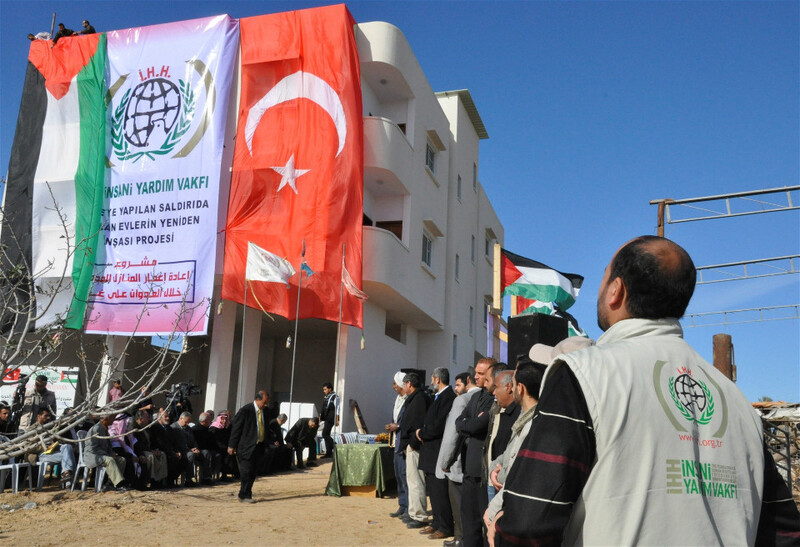The Electronic Intifada Gaza Strip 30 January 2012

International Islamic aid agencies maintain a presence in Gaza.
IRINGAZA CITY (IRIN) - Secours Islamique France is a respected aid agency, part of the global Islamic Relief network based in the UK, but when it comes to helping Palestinians in Gaza, its operations are challenged by both Israeli bureaucracy and its own “no-contact” policy with Hamas officials within the Strip.
Hamas is branded a “terror” organization by many western countries, despite the party’s victory in the 2006 Palestinian Legislative Council elections. That requires Secours Islamique France, and all other international charities working in Gaza, to tread extremely carefully to avoid falling foul of anti-terror legislation.
US rules, specifically their definition of providing support to terrorism, are the most stringent, according to a paper on counter-terrorism and humanitarian action by the Humanitarian Policy Group (HPG), part of Britain’s Overseas Development Institute. “In the US, no knowledge or intention to support terrorism per se is required [for criminal responsibility] if support is knowingly provided to a designated Foreign Terrorist Organization,” says the report.
In the UK, “having reasonable cause to suspect” that support will contribute to terrorist activity is enough to attract criminal responsibility.
This notion of “support” under US and UK anti-terror legislation means that, for example, when Secours Islamique France distributes milk and fortified biscuits daily to 10,000 pre-school children in Gaza, it must only deal directly with the schools, to avoid any contact with the education ministry.
The Israeli blockade of Gaza, tightened after Hamas seized power in 2007, is an additional impediment to international organizations operating in the territory, increasing costs and affecting project oversight.
In terms of access by international staff, Secours Islamique France has repeatedly applied for permission to enter Gaza via Israel, but is refused each time, according to country director Adel Kaddum. The group is still awaiting the verdict on its 2010 request to officially register as an international non-governmental organization in Israel; Islamic Relief UK, which delivers aid in 25 countries, applied several years ago but has yet to be approved.
Sharpened by Islamophobia
While all charities operating in Gaza face similar frustrations, an aid worker, who asked not to be identified, said Israel’s objection to assistance reaching Hamas was sharpened by Islamophobia when that aid was delivered by Muslim charities.
At the practical level, Islamic organizations face greater movement and access restrictions than other agencies because some are banned by the Israeli authorities, according to Ahmed Shurrab, including his own agency, Interpal.
But the restrictions are not insurmountable. “Israel has denied requests for permits for humanitarian staff to enter Gaza, but with the Rafah crossing [along the Gaza-Egypt border] functioning better, we [expect] international staff may be able to enter,” Muslim Hands International director Saed Salah said.
Financing, however, can be a problem, with US anti-terrorism legislation complicating transfers to organizations operating in Gaza. The Office of Foreign Assets Control (OFAC), under the US Treasury Department, administers and enforces economic sanctions against countries, groups and individuals deemed a threat.
“Banks are very sensitive, particularly in Gaza, and even if an entity is not marked by OFAC, it can still be assessed as a risk,” said the governor of the Palestine Monetary Authority, Jihad Al-Wazir.
Blacklisted
Interpal was defined as a “Specially Designated Global Terrorist” that aids Hamas and was blacklisted by OFAC in 2003.
“Due to the banks being threatened by the US that they will lose their US operating licence if they deal with ‘terrorists,’ we do not have full and open banking facilities,” Interpal’s Gaza field office manager, Mahmoud Lubbad, said. “That makes life difficult, but not impossible.”
Interpal’s UK headquarters are able to make euro-denominated transfers directly to its implementing partners in Gaza.
The UK’s Charity Commission has launched two investigations into Interpal, and on both occasions concluded that the evidence did not substantiate Washington’s claim that the organization was linked to political or militant activities.
In an out-of-court settlement in 2005 the Board of Deputies of British Jews said it should not have described Interpal as a “terrorist organization,” in response to a libel suit filed by Interpal against the Board.
“We believe it was a political decision made at the request of the Israeli foreign ministry,” said Lubbad. “There was no due process, no investigation beforehand (and despite subsequent open invitations for the US government to send investigators to look us over, they have never been taken up) and it is a costly exercise to even request to be removed from the ‘terrorist’ list.”
International Islamic organizations step up activities
However, despite the movement and access restrictions on humanitarian staff and supplies, and obstacles to the transfer of funds into Gaza, the number of Islamic organizations working with the vulnerable in Gaza is actually increasing.
Ten new Islamic agencies have opened offices in Gaza since Israel’s large-scale military operation in Gaza — Operation Cast Lead — ended in January 2009, bringing the total to 24, according to Ayman Ayeish, information director of the Hamas-led Interior Ministry in Gaza. A total of 75 international organizations and about 900 local organizations maintain offices in Gaza.
This item comes to you via IRIN, a UN humanitarian news and information service, but may not necessarily reflect the views of the United Nations or its agencies. All IRIN material may be reposted or reprinted free-of-charge; refer to the copyright page for conditions of use. IRIN is a project of the UN Office for the Coordination of Humanitarian Affairs.


